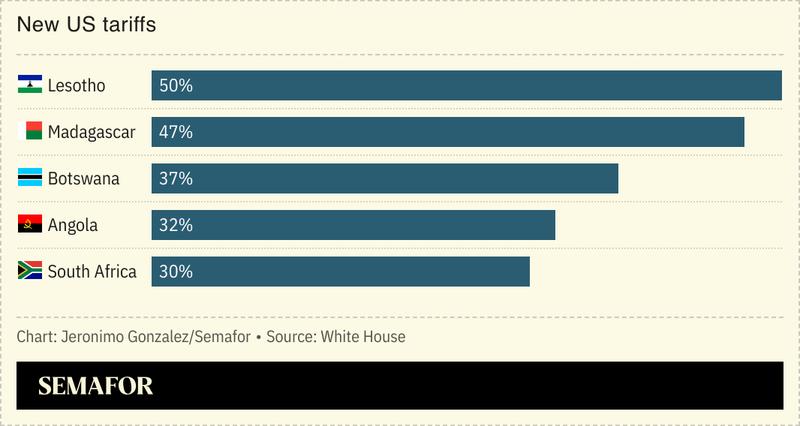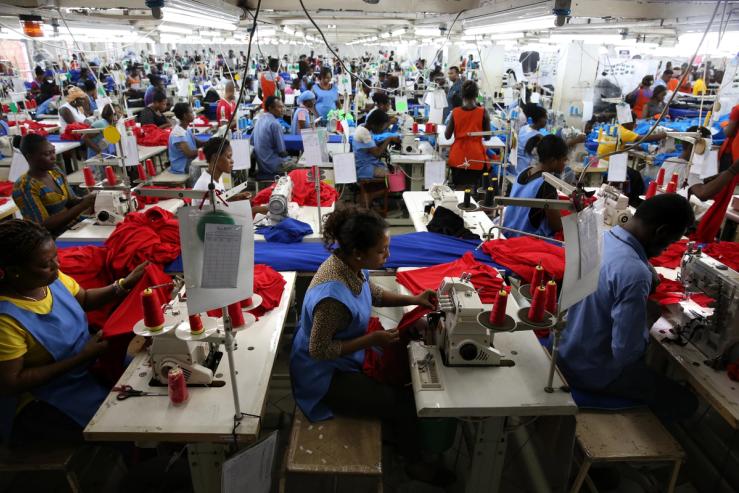The News
The United States’ flagship economic policy for Africa was effectively killed on Wednesday after US President Donald Trump, reset the global trade world order with a rash of tariffs for countries trying to access the US market, Africa watchers on Capitol Hill said.
AGOA (African Growth and Opportunities Act), the preferential trade program which has enabled sub-Saharan African countries tariff-free exports to the US since 2000, is set to expire this September if Congress does not renew it. But, as one Hill staffer told Semafor, its chances of renewal are now “narrow and windy.” Another Congressional aide explained: “Timing is everything, so while it’s not dead, there are few options to move it forward. Any business planning on its continuation now must assume that the authority will lapse.”
Lesotho, Madagascar, Botswana, Angola, and South Africa were the hardest hit in sub-Saharan Africa by Trump’s new “discounted reciprocal” tariff regime. Analysts said African countries would need to work together in order to mitigate the worst impacts of the dramatic reset.
“There is only one way forward: Coordinate and strategize together first,” said Hannah Ryder, founder of Development Reimagined, a consultancy. “No African country should be reaching out to the US on their own without that coordination first.”
W.Gyude Moore, a former Liberian public works minister, also said African cooperation was key, putting critical minerals, local supply chains and access for US companies at the heart of any negotiation. “Africa, as a unit, should propose a “deal” using AGOA reauthorization as the vehicle. It cannot be individual countries seeking separate deals.”

Know More
Overall, African countries “woefully underutilized” AGOA, said Ken Opalo, a Georgetown University political scientist. “But in a few countries the promise of access to the US helped attract foreign direct investment and exert positive pressure on pro-business reforms.”
In 2023, US imports under AGOA topped $9.7 billion, down from $10.2 billion the previous year. It was dominated that year by $4.2 billion in crude oil trade. It also included around $1.1 billion in apparel and over $900 million in agricultural products.
Beyond AGOA, which accounted for around 10%-15% of total US-Africa trade in recent years, it’s clear the US runs the biggest trade deficits in dollar terms with Africa’s biggest commodity exporters, including South Africa, Angola, Nigeria.
“Because we export mostly unprocessed commodities, very few countries export directly to the US, said Moore. “Those few countries who do are getting killed since they, like Madagascar and Lesotho, do not import much and the simplistic formula is harsh on countries that don’t import much.”
Yinka’s view
In Washington, there’s plenty of talk about how AGOA has been great for helping sub-Saharan African countries access the United States, the world’s biggest market. But there’s a strong sense that AGOA has never quite delivered on its promise of boosting African exports in a meaningful and sustainable way.
In fact, with or without AGOA, the US is not a key export market for the vast majority of African countries, say analysts at Renaissance Capital Africa, so most are insulated from the worst impact of this upheaval. The US imported just $39 billion of goods in 2024 from all 54 countries, “which is roughly what it imports from Mexico or Canada in just over a month.”
But as the saying goes, you’ll miss it when it’s gone. Not so much just the $10 billion of AGOA trade, which was less than 15% of overall US-Africa trade in 2023 but more so what AGOA had come to represent as the flagship US economic policy on the continent. As things stand now, in less than three months, for better or for worse, the US has ripped away the heart of its long-term engagement in Africa by shutting down USAID and upending AGOA. There’s also an expectation it will shutter US-Africa Command (Africom). There are many on both sides of these debates who see this moment as a true opportunity to reset the US-Africa relationship. One way or another, we’re set to find out what resetting really means.
Room for Disagreement
Beyond a few key countries, the US is not an important export market for the vast majority of African countries, say analysts at Renaissance Capital Africa. The US imported $39 billion of goods in 2024, “which is roughly what it imports from Mexico or Canada in just over a month. The US imports more in 24 hours from either of them (over $1 billion a day), than it imports in a year from about 40 African countries,” Rencap Africa said in an analyst note. The notable exceptions in terms of size are South Africa (37%) and Nigeria (14%) which account for around half of everything the US imports from the continent.
The View From Lesotho
Lesotho was hit with a 50% tariff on its US exports, the highest on the continent. The mountainous kingdom is now scrambling to get an envoy over to Washington to “plead our case,” its Trade Minister Mokhethi Shelile told reporters on Thursday. “My biggest concern was the immediate closure of factories and job losses,” he said. Lesotho’s tiny $2.2 billion economy has been one of the success stories of AGOA. It has built a small manufacturing base of textiles for export with famous brands such as Wrangler and Levi jeans to Trump golf gear. It also exports car parts and diamonds to the US. Altogether it did $237 million in exports to the US in 2024 — equivalent to 10% of its GDP. This has left a huge trade deficit in Lesotho’s favor since it doesn’t import anywhere near as much from the US.


